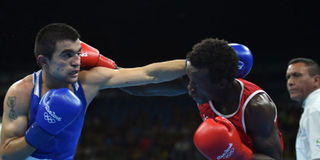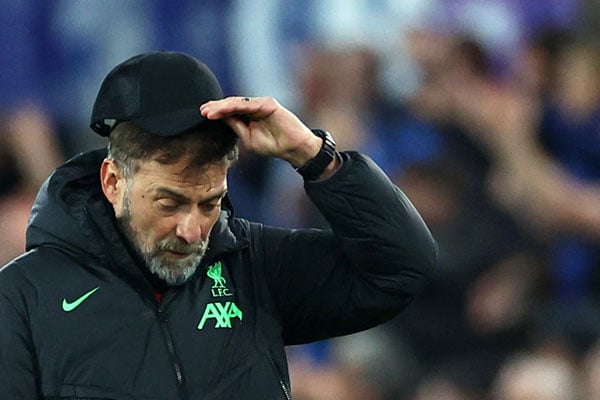World boxing struggling to beat imminent count

Armenia’s Abgaryan (L) hardly hurt Ugandan Serugo (R) but was still awarded the bout as a split decision. PHOTO BY S. BASHAIJA
After being turned into a punch-bag ahead of the start of the Games of the 31st Olympiad, Russia, who eventually fielded a depleted - but nonetheless 273-strong - team in Rio de Janeiro as retribution for reported stated-sponsored doping, leaned more squarely on the levers of what was largely perceived as biased judging decisions in the ring.
Aiba, the world amateur boxing governing body, had allowed the much-maligned Russia to run at full tilt. Fielding a 11-man strong team, Russia sought to work, however, it could to win back the trust of sceptics.
Unfortunately for the Russians, two of the three medals they won in the ring will be seized upon by the doubting Thomases as vindication for their deep-seated mistrust.
The victories of a terribly bruised Vladimir Nikitin over Ireland’s Michael Conlan in the bantamweight quarterfinals and an out-of-sorts Evgeny Tischenko over Vassiliy Levit in the heavyweight final were a watershed.
Not only were the abject decisions roundly booed, but their cloak-and-dagger intrigues represented the resentment that the results had wrought. They say that you cannot buy an Olympic medal at the shop on the corner of a street, but try telling that to Conlan.
Enveloped by a deep unease about his quarterfinal loss, Conlan delivered a sweeping rebuke that culminated in him tweeting Vladimir Putin, Russia’s President: “Hey Vlad..How much did they charge you, bro?” Conlan had earlier in an unapologetic and emotional tirade in the ring not only called the judges ‘cheats’ but also held out his middle fingers to them.
In hitting new heights of bitterness, Conlan left Aiba with egg on face. Assurances from Aiba that cheating is not organised and systemic have taken root on barren soil.
Fears of deep-rooted corruption took on added resonance when it emerged that Aiba broke ranks with the round-by-round scoring system for punches scored because it was being abused.
Errant officials would stealthily use hand and head signals to influence the R (referee) and J (judge) community. Aiba had desperately hoped that the ‘10-points-must’ scoring system introduced for these games would stave off accusations of impropriety.
Much discussed is the dark shadow that the new system has cast over the sport. The dark hints of subjectiveness still abound in the system.
Essentially, five judges dot different places ringside. Three of their tallies are randomly considered. The scoring criteria are thus: 10-9 for a close round,10-8 for a clear winner, 10-7 for a dominant winner, and 10-6 for overmatched.
Serugo’s case
Some of the parameters for scoring are clear cut (take the number of quality blows landed on the target area); others, not much so (take positioning and ability to cut off opponents in the ring). Amateur boxing cannot shed its troubled past if it continues leaving people throwing up their hands at the aimlessness of some of the scoring parameters.
Uganda flyweight Ronald Serugo for instance reached for his gearshift and found the appropriate gear against Armenia’s Narek Abgaryan but still lost on a split decision.
Those that watched the bout said that Serugo barely put a foot wrong and that it was patently absurd that he lost. Claims of favouritism extended to Eastern European boxers in Rio de Janeiro puts things in perspective.
Aiba, however, remains defiant, insisting in a statement that it ‘is fully committed to a zero tolerance policy towards fair play’. It further added in the statement that ‘less than a handful of the decisions [at Rio 2016] were not to the level expected’.
It might try to hide it, but Aiba’s soft chin is there for all to see. A knockout punch looms.
Uganda’s National Olympic Committee has to get back to drawing board
Uganda put up such a whimper at Rio 2016 after failing to podium. While the horror show has touched a nerve, it was, in fact, business as usual for Uganda.
This was the 10th time out of 15 appearances that Uganda was exiting the Games with no medal.
Some howling footnotes were nevertheless written at Rio 2016, notably diminutive Halimah Nakaayi running a PB (personal best) of 1:59.78 in the women’s 800 metres heats as well as the trio of distance runner Joshua Cheptegei, steeplechaser Jacob Araptany and middle distance runner Ronald Musagala reaching an Olympic final.
There was, however, no escaping the fact that medals were few and far between. Even the reliable marathoners failed to convert a question mark into an exclamation mark as the curtain came down on Rio 2016.
With Rio 2016 having run its course, the narrative should now revolve around whether purposeful strides are being taken. Of course they aren’t, so the narrative shouldn’t be closed ended.
Sober discussions
We need to have a sober discussion as a nation about why we keep taking the proverbial one step back for two in front. This will help us to not only steer clear of trying to reinvent the wheel, but also get in the business of cobbling together a blue-print for sustained success.
Best practices such as the one used to devastating effect in the past two Games by Great Britain should be mirrored.
Britain focuses disproportionately on sports where it has a competitive advantage. It also extends annual material support to three different types of athletes. The ones that podium at the Olympics or Worlds qualify to get £28,000 annually. Running in a top eight finish comes with £21,500 a year, while future stars settle for £15,000.
This has proven to be a resounding success with Great Britain ratcheting up the medal table into the top three echelons at both London 2012 and Rio 2016. Back at Barcelona 1992, they were an also ran after placing a distant 36th. Uganda has a decidedly scattergun approach that needs to be tweaked.
For instance, Uganda’s National Olympic Committee picks up the tab of tennis player Duncan Mugabe and weightlifter Charles Ssekaaya, who neither have a competitive or comparative advantage. Copy and pasting Britain’s template would doubtless see Cheptegei and Musagala, both believed to be under 24, podium at the Worlds and Olympics on multiple occasions.
The government of Uganda also has a great role to play if there’s going to be an upturn in fortunes. It’s however barely reassuring that putting up just a national high altitude training centre has taken years.
What we now know
We know that Usain Bolt has completed the sprint double at three consecutive Olympic Games.
The great man also signed off the Olympics with an unprecedented triple-triple.
These are staggering feats that may not be repeated for years to come. This has prompted many to class the Jamaican sprinter as the greatest ever Olympian.
We also know that with 23 gold medals to his name, swimmer Michael Phelps can also lay claim to the title of greatest Olympian.
The American’s greatness lies if not in the sheer number of Olympic medals (28 of them) then in his ability to sustain varying suc-cesses across five different Olympic Games.
So, who in your book is greatest? Bolt or Phelps, take your pick dear reader!




